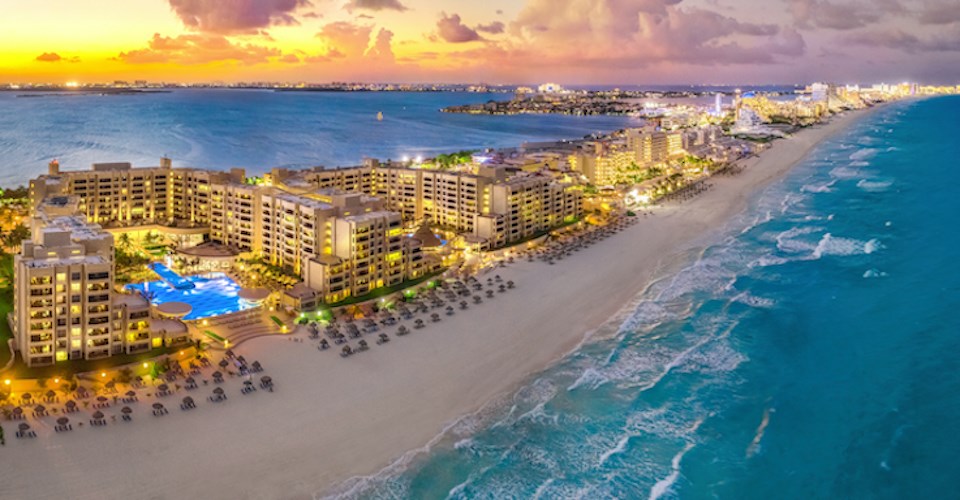Canadians dreaming of visiting the sun-soaked beaches of Cancun or Acapulco may want to have a look at the updated Mexico travel advisory before they book a ticket.
As the second-largest tourist destination for Canadians after the United States, Mexico sees upwards of three million visitors from the Great White North annually. However, there are some areas that have seen increasing rates of violence and crime over the past few years in popular vacation spots.
The Government of Canada continues to advise travellers to exercise a due to increased criminal activity and kidnapping.
While many cities across the country are mostly safe to travel to, Global Affairs has warned travellers of increased levels of violence for months, urging tourists to practice vigilance in areas and reconsider or completely avoid travel to particular areas.
As of November 2, 2023, Canada now warns against all travel -- even if it is considered "essential" -- to the Guerrero state due to impacts from Hurricane Otis, which caused the death of dozens of people. Damages to transportation and communications networks have isolated towns and the state is grappling with the threat of "armed violence, banditry, and looting in cities and on roads."
Certain areas are particularly affected by banditry and violence, including:
- Acapulco
- the highway between Acapulco and Zihuantanejo
- the highway between Acapulco to Chilpancingo
The Guerrero advisory excludes the popular tourist destinations of Ixtapa/Zihuatanejo and Taxco, but you should exercise a high degree of caution in these areas.
Canada updates its Mexico travel advisory
In 2022, Canada and its neighbours south of the border issued updated advisories for parts of Mexico due to violent crime, including homicide, kidnapping, carjacking, and robbery.
There continues to be high rates of these types of crime in popular tourist destinations such as the Mayan Riviera (Cancún, Playa del Carmen, Puerto Morelos, and Tulum), and Acapulco.
In January 2023, Canada issued a regional warning for the Sinaloa state after widespread violence broke out following the capture of a prominent drug trafficker. At least two passenger airplanes were hit by gunfire, prompting officials to close three of the airports, including Mazatlán International Airport (MZT).
A regional warning urging Canadians to avoid all "non-essential travel" to the Sinaloa state remains intact, although the resort city of Mazatlan has been excluded from the list of regional advisories.
Other cities the Canadian government warns against non-essential travel to include:
- all Chihuahua
- all Colima, except the city of Manzanillo
- all Coahuila, except the southern part of the state at and below the Saltillo-Torreón highway corridor
- all Durango, except Durango City
- in Guanajuato
- Highway 45 between León and Irapuato
- the area south of and including Highway 45D between Irapuato and Celaya
- all Michoacán, except the city of Morelia
- in Morelos
- the Lagunas de Zempoala National Park and surrounding areas
- the municipality of Xoxocotla
- in Nayarit
- the area within 20 km of the border with Sinaloa and Durango
- the city of Tepic
- all Nuevo León, except the city of Monterrey
- all Sonora, except the cities of Hermosillo and Guaymas/San Carlos and Puerto Peñasco
- all Tamaulipas
- all Zacatecas
Travellers should always check the latest advice from the government before they book a ticket from Â鶹´«Ã½Ó³»to Mexico. They should also purchase a comprehensive travel insurance policy when they book their ticket, which will cover the cost of your ticket in case you can't leave due to an unforeseeable medical or other emergency reason. It will also cover incidents like missed connections, baggage interruption and loss, and more.
Canadian travel advisories that have a "level three" or "level four" warning may be claimed under a trip cancellation and interruption plan. However, travellers can't claim insurance if they booked the flights or accommodation after the advisory was issued.
Further, Canadians should always register trips that they take before they leave so that the government can contact them in an emergency.
What to do if you need help while you are in Mexico
In case of an emergency in Mexico, dial 911.
Contact roadside assistance if you run into an issue on a highway. The Angeles Verdes is a highway patrol service that provides free assistance on all major toll highways from 8 a.m. to 6 p.m. local time.
To contact the Angeles Verdes, on your mobile device. In case of an emergency, you can also dial 078 or 800 006 8839 (toll-free in Mexico) to reach them.
Canadians in need of emergency consular assistance should contact Global Affairs Canada's Emergency Watch and Response Centre by calling 001-800-514-0129 (toll-free from Mexico only), +1 613 996 8885, by text message at +1 613-686-3658, via WhatsApp at +1 613-909-8881, via Telegram at Canada Emergency Abroad or by .



